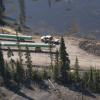It's becoming the alarming new financial norm.
More and more Canadians and British Columbians are living paycheque to paycheque, are $200 away from insolvency or are on the brink of bankruptcy.
They can't make ends meet, so they use credit cards to cover basics.
As cost of living skyrockets, incomes stagnate or disappear with a job loss or sickness.
The latest survey to point out this scary scenario is from licensed insolvency trustee firm Harris & Partners, which has offices in Duncan on Vancouver Island, Calgary, Toronto and Halifax.
The firm polled 1,134 Canadian adults from coast to coast.

The most shocking finding is that 88.9% of Canadians say they are living paycheque to paycheque.
83% have cut back on essentials such as food, heating and transportation.
81% say they feel financially stressed.
80% do not have any emergency savings set aside.
Thus, 77% could not cover an unexpected $500 expense (like the dentist, a flat tire on the car or the washing machine breaking down).
61% have used credit cards, loans or borrowing (possibly from family or a friend) to cover basic expenses in the past year.
Yet, 67% say they are to blame for their financial situation.
It's probably the shame and embarrassment that they've got themselves into a financial mess.
However, most people who are living paycheque to paycheque are not spendthrifts, squandering their money irresponsibly on exotic vacations, flash cars or designer clothes.
They are regular people who have lost a job, haven't gotten a raise in years, seen their rent or mortgage payments jump or had to put a new roof on the house.

"We are not just seeing people cutting luxuries," said Harris & Partners CEO Joshua Harris.
"We are talking about Canadians struggling with food, housing, transport and heating costs. When nearly 9 in 10 are living paycheque to paycheque, it shows how fragile household finances have become."
Financial struggles aren't just linked to stalled wages, loan and mortgage repayments and bills, but lines of credit, payday loans, overdrafts, property tax arrears, ICBD arrears and Canada Revenue Agency arrears.
Despite all this, 62% of Canadians said they believe their financial situation will improve in the next year.
"Canadians remain hopeful and that says a lot about their determination," said Harris.
"But, optimism alone will not close the gap between wages and costs. We need to ensure work pays enough to live, not just to survive."
Harris said a licensed insolvency trustee can help with advice or putting together a loan consolidation, consumer proposal or, as a last resort, a bankruptcy.
Thumbnail photos by Sander Sammy and SEO Galaxy on Unsplash


















